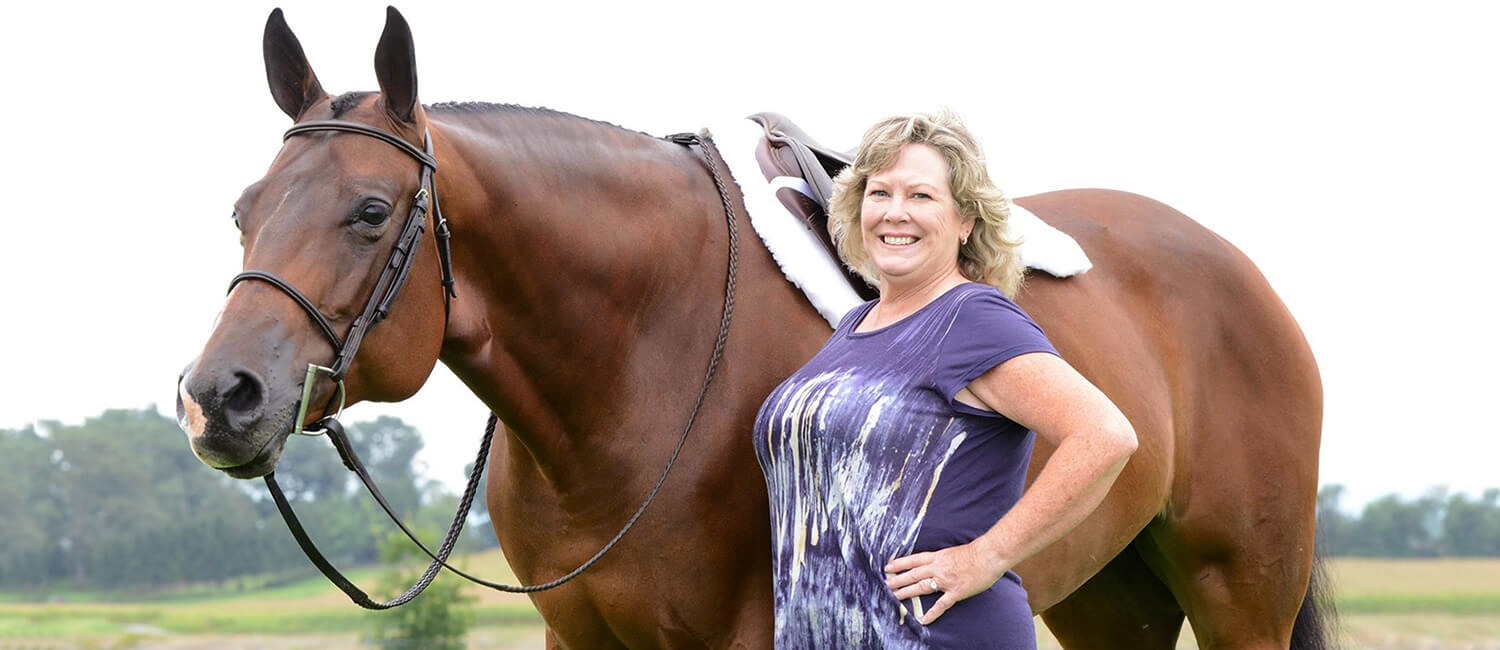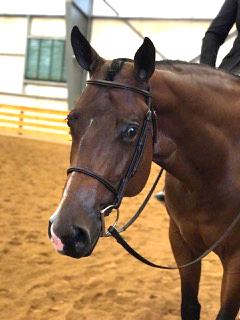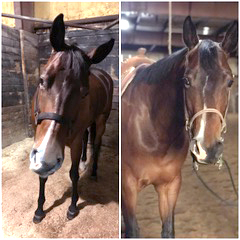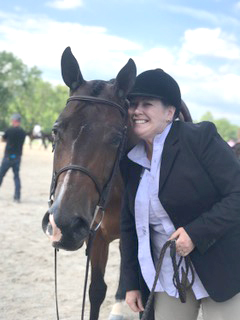 “Allie Kat is the friendliest, sweetest horse. She loves everyone,” said Tracy Barbeito about her six-year-old Quarter Horse. But the mare’s big-hearted nature isn’t always a good thing. Because the performance horse “loves to please,” her charming personality can make it hard to know when she’s not okay. It took an alarming head tilt a little more than a year ago to alert Allie’s caretakers that something was amiss with the horse’s health.
“Allie Kat is the friendliest, sweetest horse. She loves everyone,” said Tracy Barbeito about her six-year-old Quarter Horse. But the mare’s big-hearted nature isn’t always a good thing. Because the performance horse “loves to please,” her charming personality can make it hard to know when she’s not okay. It took an alarming head tilt a little more than a year ago to alert Allie’s caretakers that something was amiss with the horse’s health.
“My trainer was getting ready to leave for a show with Allie when she noticed her head was positioned oddly,” remembered Barbeito. “Otherwise Allie was very much herself—eating, nickering, running, and playing. Everything seemed fine except her head was sideways. We thought it might be chiropractic, because Allie sees a chiropractor once a month and had missed an appointment. But two days later, her left side wasn’t functioning correctly. She was still eating and acting otherwise normal but clearly something was wrong.”
The horse’s regular veterinarian in Maryland, where they live, urged Barbeito to go to New Bolton Center. “We got to the hospital at about 10:00 in the morning,” said Barbeito. “As soon as we arrived at Penn Vet, Doctor Michelle Linton looked at Allie and immediately thought EPM.”
 EPM or Equine Protozoal Myeloencephalitis is a common and dreaded diagnosis for horse lovers. It’s caused by contact with the feces of opossums infected with the parasite Sarcocystis neurona.
EPM or Equine Protozoal Myeloencephalitis is a common and dreaded diagnosis for horse lovers. It’s caused by contact with the feces of opossums infected with the parasite Sarcocystis neurona.
“Opossums are the definitive host of this parasite,” said Dr. Amy Johnson, Assistant Professor of Large Animal Medicine and Neurology at New Bolton Center. “Basically, opossums excrete the infective stage in their feces. More horses end up being exposed to the parasite than you would think because opossum feces contaminate the water source or potentially the horses’ pasture, hay, or other feed stuff.”
EPM is life threatening when untreated. “It can affect a horse’s ability to eat, swallow, and breathe,” Johnson explained. “It can also make them so wobbly or uncoordinated they can't get up. And horses just don't survive if they can't stand up.”
When Allie arrived at New Bolton Center, she had vestibular ataxia, a severe loss of balance and coordination.
“EPM can be a tricky disease because it can cause any number of neurologic signs. In Allie’s case, my suspicions were high because of the sudden onset of symptoms and the fact that she was getting worse very quickly,” said Linton, Staff Veterinarian, Internal Medicine and Emergency and Critical Care. “By the time Allie arrived at New Bolton Center, she wasn't able to walk to her stall without our support—she was leaning and falling to the left and not sure where to put her feet.”
After some preliminary tests, including an endoscopy and skull x-rays, a spinal tap confirmed Linton’s suspicions. The horse tested positive for antibodies against the protozoal parasite that causes EPM. “A spinal tap is one of the best ways to get information about the brain and brain stem,” said Johnson.
 Linton, began treating the horse right away with the medications Rebalance and Marquis. Allie, who rested in a sling during her hospital stay, remained at New Bolton Center for several days until stable and able to stand on her own.
Linton, began treating the horse right away with the medications Rebalance and Marquis. Allie, who rested in a sling during her hospital stay, remained at New Bolton Center for several days until stable and able to stand on her own.
“The wonderful thing about having a patient with Allie’s temperament is that while she was confused, she was sensible about letting us work with and treat her,” Linton said. “Her improvement was remarkable. We were thrilled to see how great she looked after her initial round of treatment.”
Allie went home with a tailored care plan. “Relapses are fairly common,” said Johnson. “It's a little bit unclear whether that’s because the parasite isn’t eliminated during treatment or whether the animals come across more parasites in their environment.”
What veterinarians do know for sure is relapses are often associated with stress. “Things like long distance travel or showing,” Johnson said. “For Allie being a performance horse, one of our biggest concerns was relapse. We developed some long-term treatment strategies, keeping her on a low level of medications especially while she performed.”
For Barbeito, getting Allie back out on the show circuit again was low priority. “I wasn't sure she'd ever come back to be a show horse,” she said. “I just wanted her to be okay enough that I didn't have to put her down.”
But Allie came back. And she came back strong.
 Slowly, after a few months of rest and medication, Barbeito put Allie on a lunge line. She sent a video to Johnson and her regular vet. “They both said she looked really good, so I started walking her. We walked together for about six weeks. Then we trotted and then we cantered—I cried the first time she cantered, I was so happy!”
Slowly, after a few months of rest and medication, Barbeito put Allie on a lunge line. She sent a video to Johnson and her regular vet. “They both said she looked really good, so I started walking her. We walked together for about six weeks. Then we trotted and then we cantered—I cried the first time she cantered, I was so happy!”
At the end of May 2018, seven months after being hospitalized, Allie competed in the American Quarter Horse Association (AQHA) Novice Championship, finishing in the top 10. From there, she earned her Amateur Superior Award in September and qualified for the AQHA World Championship show in Oklahoma. Barbeito and Allie did the long drive to Oklahoma City, where the indefatigable horse came in among the top 12 finishers.
“Allie had qualified for the World Show before, but we never made the trip,” Barbeito said. “We did this year—she’s been really ‘on her game,’ and I wanted her to have the chance to compete. She has such a big heart, and I let her show it after all she’s been through.”